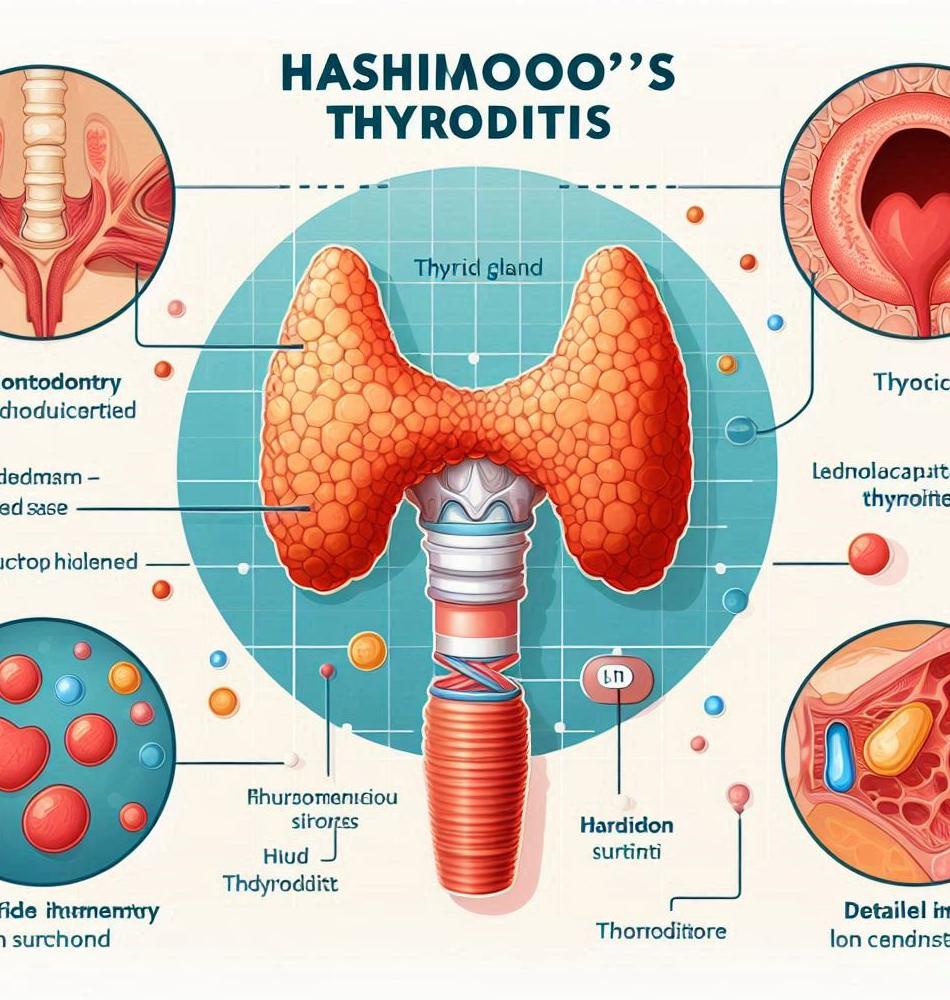Unraveling the Mystery: What Causes Hashimoto's Thyroiditis? 🔍
Discover the causes of Hashimoto's thyroiditis, a condition affecting thyroid function, and learn about its symptoms, risk factors, and treatments.
Hashimoto's thyroiditis is a chronic autoimmune disorder that affects millions of individuals worldwide. This condition is named after the Japanese physician, Dr. Hakaru Hashimoto, who first described it in 1912. It occurs when the immune system mistakenly attacks the thyroid gland, leading to inflammation and an underactive thyroid, or hypothyroidism. But what causes this condition? Let’s dive deeper.
Understanding Hashimoto's Thyroiditis: A Closer Look 🔎
Hashimoto's thyroiditis is not just a singular condition but a complex interplay of various factors that come together to initiate thyroid dysfunction. To truly understand the causes, we must consider a multitude of elements ranging from genetics to environmental triggers.
The Genetic Factor: Why Family Matters 🧬
One of the surprising discoveries in the study of Hashimoto's thyroiditis is the significant genetic aspect. Certain genes may predispose individuals to develop autoimmune disorders. If you have a family history of thyroid disease or other autoimmune conditions, your risk for Hashimoto's increases. Some key points regarding genetics include:
- Family history plays a pivotal role in susceptibility.
- Specific genes related to autoimmunity have been identified.
- Hereditary conditions like rheumatoid arthritis and type 1 diabetes are also linked to Hashimoto's.
Gender and Age: The Influencing Factors ⚦
Hashimoto's thyroiditis is significantly more common in women than in men, with estimates suggesting that women are affected at a rate of approximately seven to one compared to men. The onset often occurs during middle age, commonly between the ages of 30 and 50. Some reasons for this discrepancy could be:
- Hormonal fluctuations during times like pregnancy and menopause may play a role.
- Women have a unique immune response that might increase the risk of autoimmune diseases.
- Age-related changes can influence thyroid function.
Environmental Triggers: What Really Sets It Off? 🌍
While genetics lays the groundwork for Hashimoto's, it's often environmental factors that trigger the actual onset of the disease. The following elements can contribute:
- Infections: Viral or bacterial infections may provoke the immune system and inadvertently lead to thyroid inflammation.
- Autoimmune Disorders: The presence of other autoimmune disorders increases the risk of developing Hashimoto's.
- Toxic Exposure: Environmental toxins, such as heavy metals, have been implicated in the development of various autoimmune conditions.
- Iodine Intake: Iodine is essential for thyroid function, but both deficiency and excess can lead to thyroid problems.
Hashimoto's Thyroiditis Symptoms and Diagnosis 🩺
Recognizing the symptoms of Hashimoto's thyroiditis is crucial for timely diagnosis and treatment. Common symptoms may include:
- Fatigue and weakness
- Weight gain
- Cold intolerance
- Joint and muscle pain
- Dry skin and hair loss
- Constipation
- Depression and memory issues
Upon experiencing these symptoms, it is important to visit a healthcare provider for proper evaluation. Diagnosis typically involves blood tests to check levels of thyroid hormones and antibodies against the thyroid gland.
How Does Hashimoto's Affect the Body? 🌡️
The increased presence of antibodies leads to inflammation of the thyroid gland, resulting in a decreased ability to produce thyroid hormones. This hormonal deficiency translates to a range of health issues, effectively slowing down bodily functions. Over time, untreated Hashimoto's can lead to serious complications.
Prevention and Management: Navigating Life with Hashimoto's 🌈
While it may not be possible to prevent Hashimoto's thyroiditis entirely, there are several management strategies that can help control symptoms and maintain quality of life:
- Regular monitoring of thyroid hormone levels.
- Adopting a well-balanced diet rich in fruits, vegetables, and lean proteins.
- Consideration of dietary changes, such as avoiding gluten, if necessary.
- Medications to replace or supplement thyroid hormones.
- Stress management techniques like mindfulness or yoga.
Frequently Asked Questions About Hashimoto's Thyroiditis ❓
- What is Hashimoto's thyroiditis? It is an autoimmune condition where the immune system attacks the thyroid, leading to hypothyroidism.
- How is Hashimoto's diagnosed? Through blood tests that check thyroid hormone levels and antibodies.
- Can Hashimoto's be cured? There is no cure, but it can be managed effectively with treatment.
- What lifestyle changes can help manage symptoms? A healthy diet, regular exercise, and stress management are beneficial.
Final Thoughts: What Lies Ahead for Hashimoto's Patients? 🌠
Hashimoto's thyroiditis is a multifaceted condition that continues to puzzle researchers and health professionals alike. Although understanding its causes remains a complex endeavor, raising awareness about the various factors can provide individuals with better tools for managing their health. By exploring the genetic, hormonal, and environmental influences, patients can empower themselves to take proactive steps toward maintaining their well-being.
In conclusion, while Hashimoto's thyroiditis may be a challenging diagnosis, with the right approach and support, individuals can successfully navigate their journey. The key lies in understanding the underlying causes, recognizing symptoms, and adopting a holistic management strategy.
.png)






